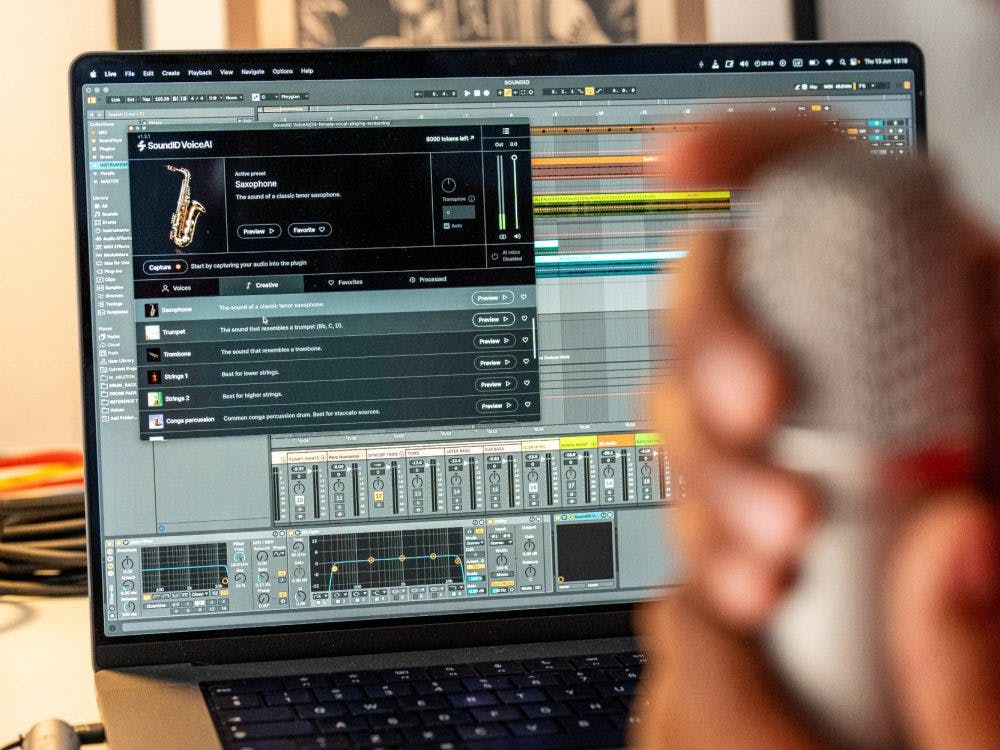AI-powered vocal plugins represent the latest evolution in pitch correction technology, offering more intuitive and natural-sounding results than traditional methods. These advanced tools use machine learning algorithms to analyze vocal performances and make intelligent adjustments that preserve the original character and emotional qualities of the voice. Unlike conventional autotune, AI vocal plugins can understand musical context, resulting in corrections that sound less robotic and more authentic. For music producers and recording artists seeking professional-quality vocal tracks, AI-powered pitch correction provides a sophisticated solution that combines technical precision with artistic sensitivity.
Understanding AI-powered vocal plugins for pitch correction
AI-powered vocal plugins represent a revolutionary advancement in audio processing technology, transforming how producers and engineers approach pitch correction. These sophisticated tools have evolved significantly from the early days of basic autotune, which often created the notorious “robotic” effect associated with heavily processed vocals.
Modern artificial intelligence algorithms can now analyze vocal performances with remarkable precision, identifying not just pitch problems but understanding the musical context and the singer’s unique vocal characteristics. This contextual awareness allows AI systems to make smarter decisions about how and when to apply corrections.
The technology works by creating complex models of vocal performance, analyzing elements such as pitch transitions, vibrato patterns, and even emotional expression. When a note is off-key, the AI doesn’t simply snap it to the nearest correct pitch – it considers how a skilled vocalist would naturally approach that note, preserving the human qualities that make performances compelling.
This evolution marks a significant shift from correction-focused tools to enhancement-focused technologies that respect and maintain the artist’s original expression while improving technical accuracy.
How do AI vocal plugins differ from traditional autotune?
AI vocal plugins fundamentally differ from traditional autotune through their intelligent, context-aware approach to pitch correction. While conventional autotune tools apply mathematical rules to shift notes to the nearest semitone, AI-powered solutions analyze the entire vocal performance to understand its musical context and emotional intent.
Traditional autotune typically works by:
- Applying uniform pitch correction based on preset rules
- Focusing primarily on note accuracy rather than natural transitions
- Creating more noticeable artifacts, especially at higher correction settings
- Requiring extensive manual tweaking to achieve natural-sounding results
In contrast, machine learning algorithms in AI vocal plugins:
- Adapt to the singer’s unique vocal style and characteristics
- Preserve natural-sounding pitch variations that convey emotion
- Process transitions between notes more smoothly
- Reduce the need for manual intervention with intelligent automated processing
This evolution means producers can achieve professional-quality vocal tracks more efficiently while maintaining a genuine human feel. The AI approach produces results that sound polished without the artificial quality that has become associated with heavily processed vocals in certain genres.
What types of pitch problems can AI vocal plugins fix?
AI vocal plugins can address a remarkably wide range of pitch-related issues, far beyond what was possible with earlier correction technologies. These advanced tools excel at identifying and fixing various vocal imperfections while maintaining the natural character of the performance.
The most common pitch problems these AI music production tools can resolve include:
- Intonation drift: Subtle pitch wandering that occurs naturally during longer phrases
- Note onset issues: Imprecise pitch at the beginning of notes, where singers often slide into the correct pitch
- Vibrato inconsistencies: Uneven or excessive vibrato that can be smoothed or enhanced
- Pitch scooping: The tendency to approach notes from below or above
- Intervallic inaccuracies: Problems with difficult jumps between notes
- Harmonic enhancement: Creating complementary harmonies based on the original vocal
Modern AI solutions can also intelligently analyze genre-specific vocal characteristics, applying different correction approaches for classical, pop, R&B, or rock vocals. This contextual awareness allows for more appropriate styling rather than imposing a one-size-fits-all correction method.
While these tools are powerful, they do have limitations. Extremely poor performances with fundamental issues in timing or delivery may still require re-recording, as AI can enhance but not completely reinvent a vocal performance.
Are AI vocal plugins suitable for live performances?
AI vocal plugins are increasingly being adopted for live performance scenarios, though with certain considerations regarding their implementation. Their suitability depends on several technical factors and the specific performance context.
For live applications, the primary concerns include:
- Latency management: More sophisticated AI processing typically requires more computational power, potentially introducing delay. However, many modern AI vocal tools have been optimized to reduce latency to imperceptible levels on sufficiently powerful systems.
- Processing requirements: Higher-end computing power is generally needed for the most advanced AI vocal processing without performance issues.
- Reliability factors: Live performances demand rock-solid stability that some newer AI technologies are still working to achieve consistently.
Different performance contexts have varying requirements. Studio-quality AI voice transformation with extensive processing may work well in controlled venue environments with professional audio setups, while more modest applications might be appropriate for smaller venues or mobile setups.
For performers considering AI vocal plugins in live settings, a staged approach is often wise – starting with subtle enhancements and gradually incorporating more advanced features as comfort and technical confidence increase. This approach helps maintain performance authenticity while leveraging the benefits of AI-assisted vocal enhancement.
What makes SoundID VoiceAI an effective solution for modern producers?
SoundID VoiceAI stands out in the crowded field of vocal processing tools through its innovative approach to creative vocal manipulation. Drawing on Sonarworks’ established expertise in audio calibration, this solution addresses the fundamental challenges that producers face when working with vocal recordings.
The effectiveness of SoundID VoiceAI stems from several key advantages:
- Advanced algorithmic processing that preserves the emotional nuances of performances
- Intuitive interface that simplifies complex vocal editing tasks
- Versatile preset library offering creative options beyond basic pitch correction
- Exceptional audio quality that maintains clarity even with substantial processing
Modern producers need tools that can both fix technical issues and serve as creative instruments for sound design. The technology excels at transforming vocals while maintaining their authentic character—whether subtly enhancing a lead vocal or dramatically reimagining background harmonies.
The system’s flexibility allows it to serve various production workflows, from quick demo enhancement to detailed studio production, making it a valuable asset for both professional studios and independent creators working with varied vocal material.
Key takeaways about AI-powered pitch correction technology
AI-powered pitch correction represents a significant advancement in vocal processing technology, offering producers and engineers unprecedented control while maintaining natural vocal qualities. As these tools continue to evolve, they’re becoming essential components in modern music production workflows.
The most important considerations when exploring these technologies include:
- Choosing solutions that preserve the emotional qualities of performances rather than over-processing
- Understanding that even the best AI tools work most effectively with reasonably good source recordings
- Balancing technical correction with artistic intention to achieve authentic results
- Selecting tools that integrate smoothly into established workflows
SoundID VoiceAI exemplifies this evolution in vocal processing technology, offering both precision and creative potential in a single solution. Its approach to vocal enhancement builds on Sonarworks’ deep understanding of audio processing, resulting in a tool that’s both technically sophisticated and musically intuitive.
To learn more about AI-powered vocal production, read our latest article about voice cloning, conversion, and vocal synthesis. To deep-dive into the future of AI music production, read our predictions in this research article.




